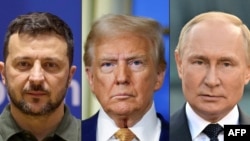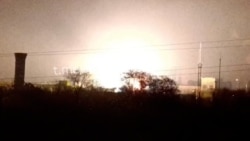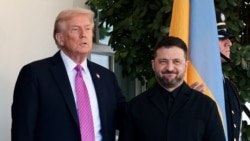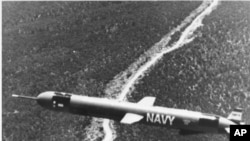Europe jumped into action on October 20 with a flurry of moves and announcements at it looked to ratchet up pressure on Russia and bolster support for Ukraine after US President Donald Trump reportedly pushed his Ukrainian counterpart Volodymyr Zelenskyy to give up land as part of a peace deal.
Senior European Union officials and Zelenskyy himself started off the day expressing doubts about Russian President Vladimir Putin's willingness to end the more than three-year war in Ukraine as the prospect of a summit in Budapest with US President Donald Trump looms.
Zelenskyy said that he's "ready" to sit down for peace talks in the Hungarian capital, a venue criticized by the European Union given there's an International Criminal Court arrest warrant outstanding against Putin.
Reacting to press reports that Trump pressed Zelenskyy to give up land as part of a peace deal, European Union foreign policy chief Kaja Kallas said that while Trump's peace efforts are welcome, "we don't see Russia really wanting peace."
"What we must not forget is that Russia is the aggressor and Ukraine is the victim here, so putting the pressure on Ukraine as the victim is not the right approach," Kallas said after a meeting of EU foreign ministers.
Speaking to reporters at the White House in Washington on October 20, Trump was asked if anything had changed since his recent phone call with Russian President Vladimir Putin. Shortly before that call, the US president had said he believed Ukraine could win back all of the occupied territory and, perhaps, even more.
"I still believe they can. I don't think they will. You never know,” Trump said. Asked about his reaction to nightly Russian air attacks on Ukraine, Trump said that soldiers are the ones dying in the largest numbers. The US president went on to say that "we are still in a process of making a deal [to stop the war]. If we do, it will be fantastic. If not, a lot of people will pay a very heavy price.”
Diplomatic sources told RFE/RL that NATO chief Mark Rutte -- and maybe other officials -- was likely headed to Washington on October 22. Meanwhile, the Hungarian foreign minister told a briefing in Budapest that he would travel to the US capital on October 21. He gave no details of the trip.
The Ukrainian president said that he believes Putin prefers to postpone "real peace negotiations" and is reluctant to meet with him because that would require agreeing to specific positions and potential concessions to end the war.
Zelenskyy then called for added pressure on the Russian leader, saying that Putin is "afraid of sanctions" and secondary sanctions that would squeeze the Russian economy.
Zelenskyy said on social media that there will be "many meeting and negotiations in Europe this week" amid media reports that he will fly to London on October 24 where a meeting of the so-called Coalition of the Willing, comprising over 20 Western allies of Ukraine, is to gather.
British Prime Minister Keir Starmer said he will urge allies to step up economic efforts to “cripple” Russia's military.
“We must be resolute in our support for Ukraine and I’m committed to intensifying our efforts to cripple Putin’s war machine.
“Russia’s stalling tactics have shown time and time again that Ukraine is the only party serious about peace. We can all see that Putin is not and he continues to choose violence and destruction."
The Kremlin on October 20 accused Ukraine of sending contradictory signals that are making it more difficult to find a path toward peace as Moscow tries to engage in serious work with Washington.
"Full-scale preparations for the summit have yet to begin," Kremlin spokesman Dmitry Peskov told reporters in Moscow on October 20.
"Of course, everyone is fulfilling the orders given by the presidents, but
large-scale consultations, teamwork on the proper conditions for the
summit have not begun. It will begin shortly," he added.
Russian Foreign Minister Sergei Lavrov held a phone call with US Secretary of State Marco Rubio on October 20, the Russian Foreign Ministry said, characterizing the discussion as "constructive."
"The Secretary emphasized the importance of upcoming engagements as an opportunity for Moscow and Washington to collaborate on advancing a durable resolution of the Russia-Ukraine war, in line with President Trump’s vision," the State Department said in a statement confirming the call.
Trump welcomed Zelenskyy to Washington on October 17 to discuss future peace negotiations.
Zelenskyy arrived for his third meeting at the White House this year prepared to discuss a potential arms deal in which Ukraine would supply the US military with drone technologies in return for long-range Tomahawk missiles, but Trump appeared to have cooled on the idea of providing Ukraine with the weapons.
Instead, the US president urged Russia and Ukraine to immediately cease fighting, saying enough blood had been shed, and announced that he plans to meet Putin in Budapest in the coming weeks. No date has been set for the summit.
What Comes Next As Negotiators Eye A Summit In Budapest?
The Washington Post reported on October 18 that Putin demanded that Kyiv surrender full control of the Donetsk region, a strategically vital area of eastern Ukraine that is partially occupied by Moscow, as a condition for ending the war during an October 16 phone call with Trump.
In comments late on October 19, Trump said the region should "be cut the way it is now," with Russia controlling about 78 percent of Donetsk territory.
"They should stop where they are. Let both claim Victory, let History decide!” Trump had written on social media on October 17.
He reiterated those comments on October 19, saying, "You leave it the way it is right now. They can...negotiate something later on down the line."
Citing people familiar with the matter, the Financial Times reported on October 19 that Trump told Zelenskyy during their White House meeting to accept Russia's terms for ending the war, including ceding the Donetsk region.
However, in remarks to reporters on October 19, Trump denied that he had discussed Ukraine ceding Donetsk to Russia.
According to the Financial Times report, Trump warned Zelenskyy that Putin had threatened to "destroy" Ukraine if it didn't agree to his terms.
Asked in a Fox News interview whether Putin was likely to accept a peace deal without taking vast amounts of Ukrainian territory, Trump said: “Well, he's gonna take something."
“I mean, they fought and [Putin] has a lot of [Ukrainian] property. I mean...he's won certain property,” Trump said in the interview broadcast on October 19 but conducted prior to Trump's meeting with Zelenskyy and call with Putin.
Territorial concessions are expected to be part of any eventual peace deal for Ukraine, but it’s uncertain what Putin might agree to -- or what Kyiv could legally offer.
Ukraine’s constitution mandates a nationwide referendum to approve any change to the country’s territory, a vote that cannot be held under the martial law imposed since Russia’s full-scale invasion in 2022.
A key reason for Zelenskyy's trip to Washington was the possibility of Ukraine receiving Tomahawk missiles, which are capable of hitting targets at a distance of up to 2,500 kilometers.
Trump appeared to have considered sending Tomahawks to Kyiv for weeks as he grew increasingly frustrated over Putin's refusal to negotiate an end to the war but then appeared to rule out the possibility -- at least for now -- after his call with the Russian president.
Zelenskyy claimed that the issue of Tomahawk missiles is "very sensitive for the Russians" and that Putin is "afraid that the United States will deliver [them] to Ukraine" because it would allow Kyiv to strike strategic military sites and infrastructure that could derail Russia's war effort.
Zelenskyy said in his evening video message on October 20 that is is working with the United States on the purchase of Patriot air defense systems.
"In Washington, I spoke with defense companies that produce Patriots and other weapons we need," Zelenskyy said. "The willingness to work with Ukraine is fully sufficient -- Ukraine is trusted. It is important that there be enough support for this at the political level in Washington."















